“That Screaming Lady”
Lena Dunham, Jill Soloway, and other funny women on what Joan Rivers meant to them.

Photo by Terry O'Neill/Getty Images
When Sara Benincasa was 6 years old, she found a book in her parents’ basement that she knew she wasn’t supposed to read. She read it anyway. “I was like, ‘This lady is naughty! This lady’s a mom, but she doesn’t talk like any mom I’ve ever heard of!’ ” Benincasa says. The book was Joan Rivers’ 1974 Having a Baby Can Be a Scream (styled like a children’s book, it was anything but). “It was a really amazing thing, now that I think about it,” says Benincasa, now 33 and herself a comedian and author. “She planted the seed for what would later become my habit of saying things that women aren’t supposed to say.”
By the time Benincasa discovered Rivers in the late ’80s, she was supposed to be irrelevant. In the early 1980s, Rivers had released a best-selling comedy album, hosted Saturday Night Live, became the first female comic to perform at Carnegie Hall, and was named Johnny Carson’s permanent guest host on the Tonight Show. But as soon as she accepted a deal from Fox to helm her own late-night show opposite Carson, in 1986, her former mentor exiled her from his couch and never spoke to her again. Six months in, Rivers was fired from her own show. Three months later, her husband and producer, Edgar Rosenberg, committed suicide. Just like that, Rivers was “one step removed from leper status in Hollywood,” as Bill Carter put it in The Late Shift. She moved her act to daytime TV, and then to the sidelines of the celebrity red carpet, and then to crass reality shows, and then QVC, and then to the street—if nothing else, she could always think up something offensive enough for TMZ to shoot. By then, most people had forgotten that Joan Rivers ever sat behind comedy’s biggest desk.
But she never shut up. And a new crop of young female comedians were listening, even if they didn’t totally understand what they were hearing. Comedy writer Caissie St. Onge (stylized as St.Onge) first heard Rivers’ voice from the top of her childhood staircase, where she would “sneak down from my bedroom” and eavesdrop on her grandmother watching Carson. Now 42, St. Onge, a co-executive producer for Bravo’s Watch What Happens Live, recognizes the appeal of “this woman on TV who was making fun of her own flaws and insecurities,” as a “revelation to a little girl who felt flawed and insecure.” Lena Dunham first learned of Rivers “through her friendship with Miss Piggy” in The Muppets Take Manhattan (which was released in 1984, two years before Dunham was born). “I was obsessed with the tone of her voice, her manic energy, her edge of cruelty,” says Dunham, 28. “I couldn't have articulated that at the time, of course.” (Back then, Dunham called her “that screaming lady.”) Growing up as a kid in the 1990s, Emily Axford—now a writer and performer at College Humor—wasn’t into fashion, but when she sighted Rivers skewering celebrity style on the TV in her parents’ basement, “I kept watching, because here was this woman, irreverent and outspoken, and I was not used to that. The other women I saw on TV were well-behaved, postured, deferential, and attractive,” says Axford, 29. “She was rude. She was a lady, and she was rude. And it was funny. And when it wasn't, she didn't give a fuck. I didn't have many other female role models with the audacity to not give a fuck.”

Photo by Michael Ochs Archives/Getty Images
Later, the Internet opened up a window into Rivers’ former life, and as these women clicked on YouTube videos of her Carson interviews and passed around the Netflix link to the 2010 documentary Joan Rivers: A Piece of Work, Rivers claimed legend status among female comedians who weren’t even alive during her ostensible heyday. “I recommend that movie to pretty much anybody who will listen,” says New York comedian Emmy Blotnick, 26. For emerging comics, the documentary reveals how “stand-up seems so effortless only if you don’t know about the work that goes into it,” she says. The film exposes all the private effort that goes into being a woman in the spotlight, too. Los Angeles comedian Gaby Dunn, 25, knew Joan Rivers solely for her bitchy ’90s fashion commentary until she watched A Piece of Work at Blotnick’s request. “It completely changed my conception of her,” Dunn says. “I realized that she’s this rare, brave person who came up in—and in some ways became complicit in—the poisonous environment for female comedians.” “Joan Rivers—where have you been all my life?” is how Manohla Dargis began her New York Times review of the film. As Julie Klausner put it on Thursday: “Before I met Joan Rivers ... I spent an afternoon researching her online, and, in the process of doing so, realized she was my idol.”
For these women, Rivers’ age became her central asset, not her liability. “When actresses stop being hot, they die. Isn’t that how it’s supposed to go?” Dunn told me. “She had the audacity to keep going, even when she was mocked for being a woman and mocked for being old.” She became “our comedy mother,” Transparent writer and director Jill Soloway told me. “She was the first Jewish woman to step out there in the middle of the street amidst all the traffic of misogyny and say, ‘Fuck all of you.’ ” Rivers “caught a lot of shit that us younger women didn’t have to deal with,” Benincasa says. “But also a lot of shit that we still have to deal with”—or will have to face a few decades down the line. “I want to be Joan Rivers when I grow up. Like, in my 60s.”
When Rivers gained her own late-night spot opposite Carson in the ’80s, a then-teenage St. Onge didn’t understand the significance. “Now I know better,” she says. St. Onge keeps waiting, but Rivers remains “to date, the only female ever to have a late-night talk show on a major network.” Dunham calls her “a major reason why flawed, complex, angry women”—women like Dunham herself—“are allowed on television.”














